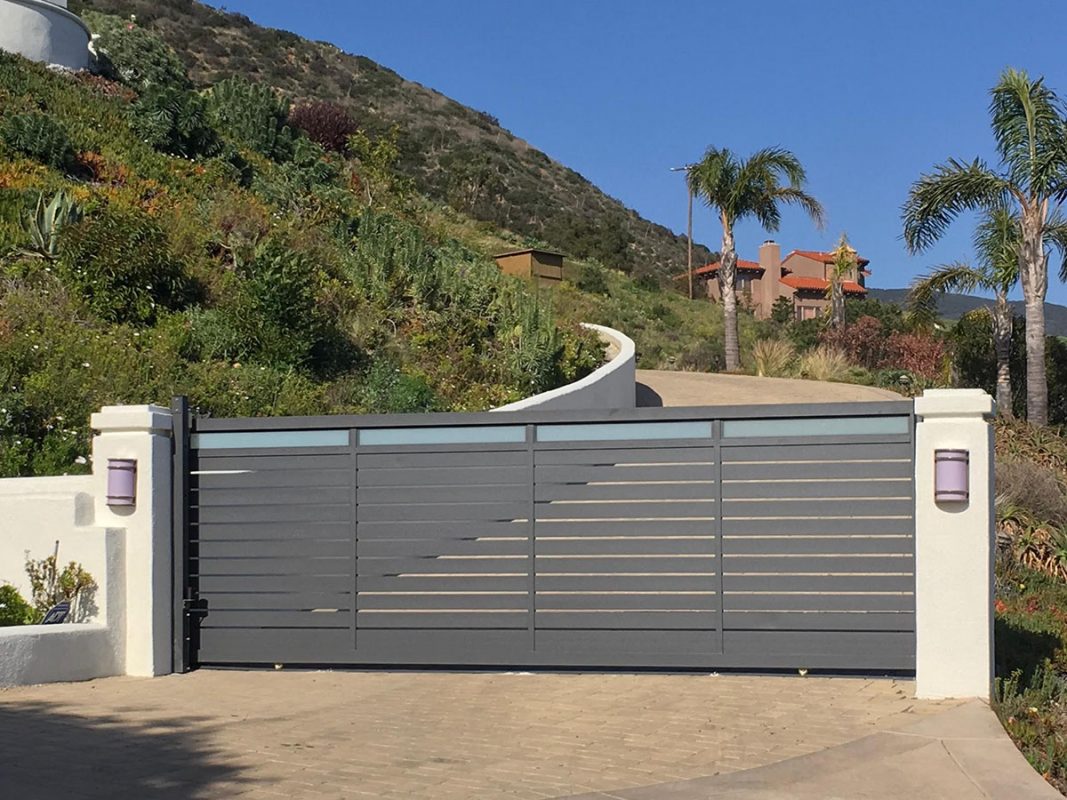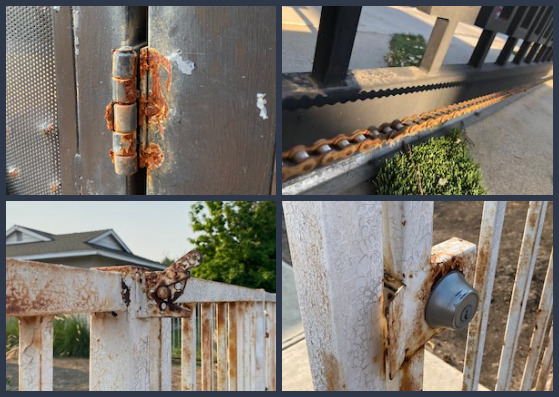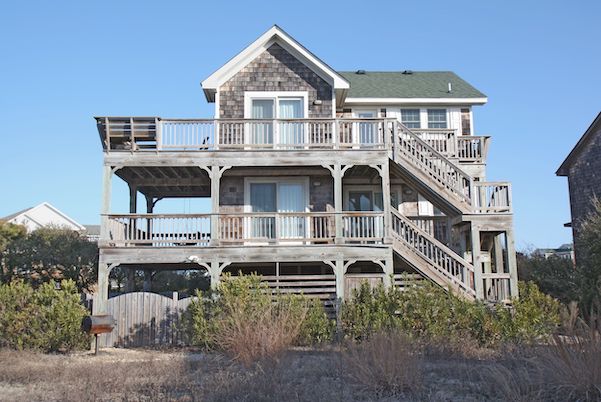Beach community fences and gates can be troublesome! Before you buy and install, completely confront the Big Four challenges of building at the beach: Sand, Salt, Water, and Wind.
These elements are the enemies of construction at the beach.
You should take a walk around the beach community you are living in or considering moving to. Doing so, you’ll see many homes that look “run down”! Now, this is although these beach homes often two or three times as expensive as homes just a few miles inland!
Homes closer to the beach are getting constantly “attacked” by sand, salt, water, and wind. Combinations of these corrode and grind away time, anything in their path.
And that includes gates and fencing!
I have spent a good percentage of my nearly thirty years of gate and fence contracting at the beach! I’d like to say that I was primarily surfing and partying, but I was mainly solving gate fencing problems.
What’s The Best Fence and Gate For a Beach Home?

This oceanside gate is not corroded by the continued spray of water, salt, sand, and wind. This powder-coated aluminum gate replaced an earlier steel gate that had been destroyed by these forces.
You want to do this right! The fence and gate you choose will have to cope with sand, salty air, water, and wind. These things can gradually or quickly destroy a fence and gate installation.
Let’s go over the “Big Four” one by one. I don’t know which of these is the biggest culprit. I’ll start with water, as it’s a problem for gates and fences everywhere, not just in beach communities.
Water – This is a problem.
If your home is very close to the ocean, the physical spray of the ocean has lots of salt in it. This salt is very corrosive to typical fence and gate materials, and their finishes. The most conventional fence building materials are steel and wood. Steel will rust after continued ocean spray. Wood will absorb the water, salt, and organic material in ocean water and expand and contract and rot and disintegrate.

From top left, clockwise: steel gate hinges move and break up the finish, allowing water in and rust to develop, heavy iron or wood gates require chain drives that rust. Our lighter-weight aluminum gates have more efficient motors that do not rust. The bottom two pictures show what happens when water gets below the paint in any iron gate installation. The water gets in and wicks through the entire gate, resulting in deterioration and eventual metal failure.
You can finish steel or wood with various materials. We can dip steel in zinc, and then powder-coat it. Still, all it takes is a nick or an abrasion to break through to the metal, and you’ve got the beginnings of trouble.
Also, you can seal or finish wood in various ways, all of which have to be considered as “temporary solutions”. (Wood fence close to the beach often needs to be refinished as much as two times a year.)
The Wind is a Big Problem for Beach Fencing.
Winds are a problem in many coastal areas. We have our USA factory in Los Angeles. Throughout the area, the famous “Santa Ana winds” blow through towns and cities.
There are two problems that wind introduces to beach community gates and fencing.
Number one: The wind picks up sand and slams it against the fencing, causing the finish of the fence itself to break down. (We’ll discuss this in the next section of this article.)
Number two: The wind can “catch” some fence panels or gates and cause damage.
You need to be very careful in installing fences and gates in windy areas. Some people like to install privacy fencing in order to create a buffer against the wind. You can do this, but make sure that it is not a full privacy fence that is solid, but a partial-privacy fence that is slatted.
Poorly placed or installed privacy gates and fence panels can behave as if they were wind sails, catching the wind and pulling down the fence. Wind can make a gate very dangerous, as a powerful gust can catch the gate and slam it into a person, causing injury.
The safest option for very high and unpredictable winds is to fence with picket panels and gates. There are various trees and bushes that landscapers advise as well.
You can install more solid privacy gates and fences. Make sure you hire an experienced professional.
Sand Erodes Metal, Wood, and Finishes
Have you ever lived or visited a house several blocks from the beach? Do you remember sweeping up piles of sand?
I’ve often stayed at hotels and bed and breakfasts some blocks from the actual ocean. It used to surprise me how much sand would accumulate on the floor by the end of the day, just from leaving the windows open. Nature makes ocean sand from very fine and light particles that are quite strong.

The wind, sun, salt, and moisture all take a toll on a home, particularly on the exterior. Although this home still retains its charm, the wood has been bleached and shows signs of deterioration.
You probably have noticed that car owners living at the beach don’t get to enjoy that new car gleam so long. Painters tell me that’s mainly because of the amount of fine sand that is breezes blow over the car finish.
You have probably have heard of “sandblasting”. Manufacturers shoot air pressurized sand, not much unlike what we see at the ocean, at materials to remove the finish from them. Professional finishers sandblast metals to clean them and ready them for re-finish.
If you live at the beach, to a certain extent, anything exposed to the outside is being “sandblasted”! The windblown sand is gradually wearing away at the finish over anything metallic, or at the surface of anything made from wood. Once the sand breaks through the finish over a conventional steel fence, water and wind can ruin it. And, when the sand breaks through the finish of a wood sealant, it can erode the wood itself.
Salt Corrodes Physically and Chemically
Salt causes problems to fences and gates because of its chemical and physical attributes.
And, the salt that is in the ocean air in beach communities creates problems for steel and wood.
Regarding steel, water is the key factor that leads to rust. But coastal living introduces salt into the process, and salt added brings about chemical reactions that increase the speed of corrosion dramatically.
Regarding wood, saltwater creates other problems.
“Saltwater can speed up the deterioration of timber. Over time, UV rays will dry out timber, creating cracks for salt and moisture to seep through. From this point on, mold and rotting are inevitable.”
Article, “Does Saltwater Affect Timber?”
Published 7 Feb 2019 in News From Urbanline
Solutions for Beach Community Fences and Gates
So, what does this mean for your fencing project?
It means that, if you want to have a more trouble-free fence at the beach, choose more trouble-free materials.
Conventional Fence and Gate Materials
You can build a fence out of conventional fencing materials: metal and wood. If you do, you are going to have to be vigilant for problems coming and proactive in their prevention. When you build from steel or wood, you are going to need to do more things to maintain your fence. And so you are going to have to clean it more often. It also means you are going to have to finish more often.
Or you can choose a material that requires less maintenance.
Aluminum is the Best Material for Beach Community Fences and Gates
Water does not adversely affect aluminum. Aluminum is the premier outdoor building material in construction. If a builder needs to protect from corrosion, aluminum is the material of choice.
Why Aluminum
When you expose aluminum to water, it does not rust. Unfinished aluminum will develop a very thin layer of corrosion that protects the aluminum below it. However, Mulholland (and virtually all the top manufacturers) powder-coat their aluminum products with an extremely tough and beautiful finish for further protection.
An aluminum picket or rail fence is excellent when facing high winds. Properly installed aluminum fences and gates are fully strong enough to withstand the force of high winds. The slender pickets do not catch the wind and create sails.
Aluminum is a much better choice than steel. Steel rusts in the salt air. Even when powder-coated, a scratch that breaks through to the steel may cause a lot of damage.
Stainless steel is also an excellent choice. The major drawback to it is that it is hugely expensive to buy. Stainless is very heavy and so expensive to install.
Thank you for your attention to this article! Please feel free to contact us for further information!
GET IN TOUCH WITH US TODAY
If you have a project in mind, would like to see our prices, or simply want to check out our inventory in person; good news. We have factory tours and a showroom to help you plan out your current or future project. Call us up and talk to any of our friendly staff and ask us about our current schedule, or to explore ways we may be able to help you with your goals. If you’d like to see our latest projects, explore our inspiration gallery or follow us on Instagram, where we ongoingly post our latest completed projects.
Click the live chat at the bottom of the browser window and connect instantly with our team of experts.








